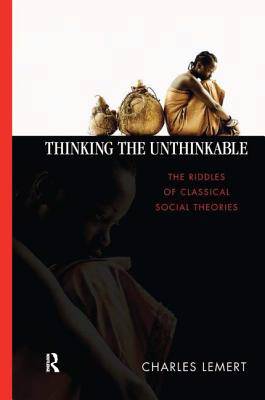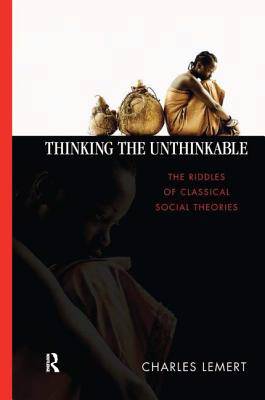
- Afhalen na 1 uur in een winkel met voorraad
- Gratis thuislevering in België vanaf € 30
- Ruim aanbod met 7 miljoen producten
- Afhalen na 1 uur in een winkel met voorraad
- Gratis thuislevering in België vanaf € 30
- Ruim aanbod met 7 miljoen producten
Zoeken
Thinking the Unthinkable
The Riddles of Classical Social Theories
Charles C Lemert
Hardcover | Engels
€ 305,45
+ 610 punten
Uitvoering
Omschrijving
In the eloquent style for which he has become famous, Charles Lemert writes of social theory as no one else. Thinking the Unthinkable is offered as text for instruction, yet it defies the prevailing assumption that social theory is a method for clarifying the facts of social life. Lemert shows how social theory began late in the 19th century as a struggle to come to terms with the failure of modern reason to solve the social problems created by the capitalist world-system. Since then, social theory has developed through twists and turns to think and rethink this Unthinkable. Hence the surprising innovations of recent years-postmodern, queer, postcolonial, third-wave feminist, risk theories, among others arising in the wake of globalization. Once again, Lemert has made the difficult clear in a book that students and other readers will treasure and keep.
Specificaties
Betrokkenen
- Auteur(s):
- Uitgeverij:
Inhoud
- Aantal bladzijden:
- 208
- Taal:
- Engels
Eigenschappen
- Productcode (EAN):
- 9781594511851
- Verschijningsdatum:
- 15/04/2007
- Uitvoering:
- Hardcover
- Formaat:
- Genaaid
- Afmetingen:
- 165 mm x 236 mm
- Gewicht:
- 412 g

Alleen bij Standaard Boekhandel
+ 610 punten op je klantenkaart van Standaard Boekhandel
Beoordelingen
We publiceren alleen reviews die voldoen aan de voorwaarden voor reviews. Bekijk onze voorwaarden voor reviews.











